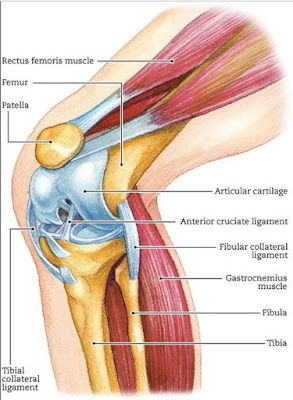How To Strengthen Your Knees

The knee is the largest joint in the body that provides stable support to your whole body. Knees also provide flexibility and stability in your legs so that you can stand, walk, run, crouch, jump and turn around with ease. Thus, it is essential to keep your knees strong and healthy.
Knees become weak with age, but people can have knee problems at any age. Weak knees can affect your mobility and make it difficult for you to carry out everyday activities, such as lifting boxes or walking downhill.
Weak knees can occur as a result of an injury or strain on the knees, nutritional deficiency, a sedentary lifestyle and excess sodium intake, smoking or drinking. It can also be due to osteoarthritis in the knee, which results from wear and tear on its parts.
If you suffer from weak knees or pain, you can make some lifestyle and dietary changes to strengthen them.
Here are the top 10 ways to strengthen your knees.
1. Knee-Strengthening Exercises:
There are many exercises that target weak knees. Such exercises help strengthen the muscles around your joints, keep the joints properly aligned and positioned as well as strengthen the bones in your knees.
Some exercises that are good for your knees include step-ups, lunges, single-leg squats, hamstring stretches with thigh contraction, straight-leg raises, knee bends and squats with a Swiss ball.
For best results, aim for 30 minutes of knee-strengthening exercises at least 4 or 5 times a week. Try to learn these exercises from an expert.
If exercises aggravate your knee pain or stiffness, stop doing them and consult your doctor. You can always discuss the suitability of these exercises with your doctor.
2. Massage:
Massage therapy is another beneficial means of adding strength to your knees and addressing your knee pain. Regular massage helps improve circulation so that more nutrients reach the weak muscles and joints to make them stronger.
Rub some warm olive, coconut or mustard oil on your knees.
Using gentle yet firm strokes, massage the knees in both clockwise and counter-clockwise directions for 10 to 15 minutes.
Do this twice daily as needed.
If you have chronic knee pain, seek the help of an experienced massage therapist.
3. Epsom Salt:
People who have weak knees or suffer from knee pain due to conditions like osteoporosis and rheumatoid arthritis often have abnormally low levels of magnesium. In such situations, Epsom salt can help reduce the discomfort.
Being high in magnesium, Epsom salt can provide quick relief and reduce inflammation around your knee joints. Furthermore, magnesium is required for proper muscle functioning and it even aids calcium absorption.
Dissolve 2 tablespoons of Epsom salt in ½ cup of warm water. Using a washcloth, apply it on your knees and wait 15 to 20 minutes before rinsing it off with lukewarm water.
Another option is to soak your body in a tub of warm water mixed with 1 cup of Epsom salt for at least 20 minutes.
Use either of the methods once or twice a week only.
4. Swimming:
Swimming is a low-impact aerobic exercise for weak knees. It allows you to exercise your knees with less pressure on the joints, making it also a great option for people suffering from knee pain or arthritis.
It can reduce your knee stiffness, strengthen the muscles around your knee joints and strengthen your bones. Plus, it improves your overall fitness.
Aim for 30 minutes of swimming 5 days per week. Strokes like the front crawl, backstroke and butterfly are beneficial for knee joints. Avoid the breaststroke, as it places the most pressure on the knee joints.
5. Calcium:
Calcium is essential for bone health and its deficiency can lead to thinning and weakening of the bones and osteoporosis. As the body cannot produce calcium naturally, dietary sources and supplements are the best options to prevent its deficiency.
Natural sources of calcium are dark leafy greens, milk, almond milk, cheese, almonds, edamame, sardines, calcium-fortified cereals, fortified orange juice, and blackstrap molasses.
If you decide to take supplements, choose one that also contains vitamin D to help your body absorb the calcium. Consult your doctor for the correct dosage.
6. Vitamin D:
For optimal bone and joint health, vitamin D is considered a threshold nutrient. A vitamin D deficiency can cause bone loss and an increased risk of minimal trauma fractures. Plus, the body cannot absorb enough calcium without adequate amounts of vitamin D.
The body manufactures vitamin D when it is exposed to sunlight, so expose your knees to early morning sunlight for 15 minutes daily.
Also, get vitamin D from dietary sources, such as fish, cod liver oil, egg yolks and fortified cereals and dairy products. If you want to take a vitamin D supplement, consult your doctor first.
7. Fish Oil:
Fish oil contains the omega-3 fatty acids called eicosapentaenoic acid (EPA) and docosahexaenoic acid (DHA) that can help strengthen knee joints and improve bone density.
It can even reduce joint pain and stiffness due to its anti-inflammatory properties.
A 2006 study published in the International Journal of Neurosurgery and Neuroscience stated that people who took 1,200 milligrams of EPA from fish oil every day noticed improvement in joint health.
Include cold-water fish, such as tuna, mackerel and salmon, in your diet twice a week.
Alternatively, take up to 2.6 grams of fish oil (with at least 30 percent EPA/DHA) twice daily. However, before starting any supplement, always consult your doctor.
8. Vitamin C:
Vitamin C is important in the formation of collagen, a major component of knee cartilage. It is essential for collagen synthesis, bone matrix quality and normal bone development.
Furthermore, this essential vitamin improves bone mass density and reduces fracture risk.
Some good sources of vitamin C include broccoli, bell peppers, papaya, oranges, lemon, strawberries and other berries, kiwi, berries, cauliflower, spinach and Brussels sprouts.
Vitamin C supplements are available as chewable tablets and capsules, which you can take after consulting your doctor.
9. Healthy Weight:
The more your body weighs, the more your joints have to work. If you are overweight, your knees will become weak due to the stress of carrying heavy weight. Plus, obesity increases the risk of knee or hip replacement.
If you are overweight or obese, consult your doctor or a registered dietitian to help you lose weight in a healthy, gradual manner. It will boost your knees’ stability and strength.
10. Anti-inflammatory Foods:
You knees can become weak and painful due to inflammation. To fight inflammation and swelling, add foods with anti-inflammatory properties to your diet.
Some foods with anti-inflammatory properties include salmon, flaxseeds, ginger, turmeric, olive oil, avocados, tart cherries, walnuts, blueberries, sweet potatoes, and spinach.
Also, eliminate inflammatory foods like white-flour products, white rice, sugary foods, soda and foods high in saturated fatsfrom your diet.
Additional Tips:
Before exercising, do warm-ups to lubricate your joints and raise your body’s temperature.
Enjoy walking and cycling to strengthen your knees.
Do not participate in sports that require sudden stopping and starting, jumping and twisting.
Stop doing activities that cause pain in your knees.
Learn yoga poses from an expert to help strengthen your bones.
Acupuncture can help relieve knee pain caused by osteoarthritis.
Avoid sitting or standing in the same position for too long.
If you smoke or drink, it is important to quit.
Do not wear high-heeled shoes.
Increase fluid intake to soften cartilage and keep yourself hydrated.
Do not eat too much salt, which can contribute to calcium loss.
loading...


